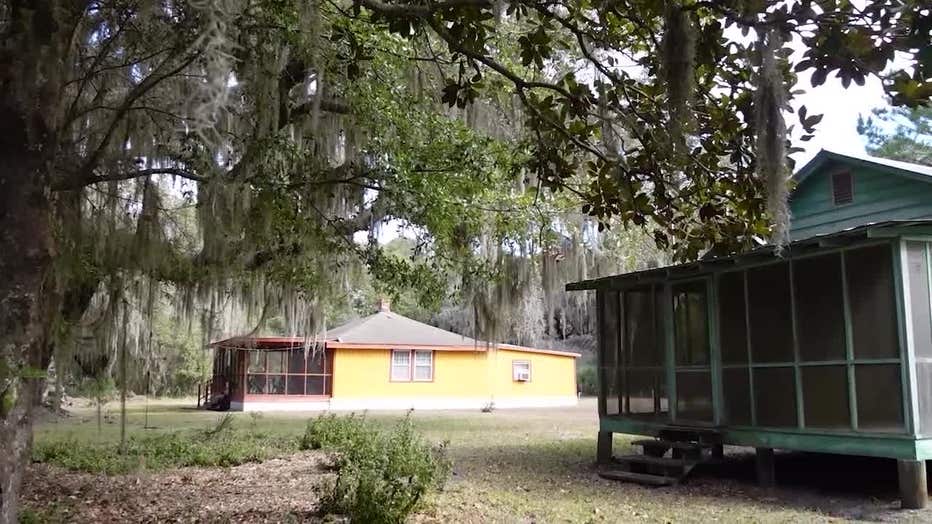Slaves' descendants seek a referendum to veto zoning changes they say threaten their Georgia island

SAVANNAH, Ga. - Two weeks after local officials weakened restrictions that for decades protected a tiny Georgia island community populated by slaves’ descendants, its Black residents hope to force a referendum that would give them the chance to override the zoning changes.
Hogg Hummock, a group of modest homes along dirt roads on largely unspoiled Sapelo Island, is one of the South's few surviving Gullah-Geechee communities. Residents vowed to fight after McIntosh County commissioners Sept. 12 doubled the size of homes allowed in the community, stoking fears that wealthy buyers would build large houses that would cause taxes to rise and force Black landowners to sell.
Hogg Hummock residents and their supporters launched a petition drive Tuesday aimed at forcing a referendum on the zoning changes. They need to collect an estimated 2,200 signatures from registered voters in the county to put the issue on a future ballot.
"We're trying to get this done quickly as possible," said Maurice Bailey, a Hogg Hummock native whose group Save Our Legacy Ourself is helping lead the petition drive. "People will start getting discouraged and people will start selling land. Taxes won't go up immediately, but they will start going up."
The Georgia Constitution allows citizens to call special elections to make "amendments to or repeals of (county) ordinances, resolutions, or regulations." Residents must first collect petition signatures from 10% to 25% of a county's registered voters, depending on its population.

Though the provision has rarely been used, opponents of a proposed rocket launchpad in coastal Camden County succeeded last year in rejecting the project at the ballot box after local officials spent a decade and more than $11 million on it. In Atlanta, activists are trying the same tactic in hopes of halting construction of a police and firefighter training center that critics call "Cop City."
Sapelo Island residents rolled out a website this week that allows McIntosh County voters to download and sign copies of their petition. They're getting assistance from the Georgia conservation group One Hundred Miles, which also helped coordinate the petition drive against the spaceport.
It took two years for the spaceport campaign to gather enough signatures to force a vote. Megan Desrosiers, president of One Hundred Miles, said that experience should help things go more smoothly in rural McIntosh County, where the smaller population means roughly half the number of signatures are needed.
About 30 to 50 Black residents still live in Hogg Hummock, which was founded by formerly slaves who had worked the plantation of Thomas Spalding. Descendants of enslaved island populations in the South became known as Gullah, or Geechee in Georgia, whose long separation from the mainland meant they retained much of their African heritage.
Hogg Hummock, also known as Hog Hammock, sits on less than a square mile (2.6 square kilometers) of Sapelo Island, which is about 60 miles (95 kilometers) south of Savannah and owned mostly by the state of Georgia.

The community's population has shrunk in recent decades. Some families have sold their land to outsiders who built vacation homes. New construction has caused tension over how large those homes can be.
Residents said they were blindsided in August when McIntosh County officials gave notice of proposed changes to ordinances that had limited development in Hogg Hummock for three decades. County officials held just two meetings prior to commissioners taking a final vote Sept. 12.
Despite vocal opposition from Black landowners who packed each meeting, commissioners raised the maximum size of a home in Hogg Hummock to 3,000 square feet (278 square meters) of total enclosed space. The previous limit was 1,400 square feet (130 square meters) of heated and air-conditioned space.
Commissioners who supported the changes said the prior size limit based on heated and cooled space wasn't enforceable and didn't give homeowners enough room for visiting children and grandchildren to stay under one roof.

Commissioner Kate Pontello Karwacki, who voted to allow larger homes, said the changes were limited in scope and that the outcry over them has been overblown.
"I think that Sapelo is unique, yes. And I think having the Gullah-Geechee descendants on the island is unique," Karwacki said. "But at the same time, being a commissioner, that's not my district. And I have to rule on things that are going to be fair for all residents throughout the county."
McIntosh County commissioners in July approved a sweeping new zoning ordinance that applied to all of the county except Hogg Hummock. They took up Hogg Hummock, which already had its own zoning rules, separately earlier this month.
Josiah "Jazz" Watts, a Hogg Hummock descendant and homeowner, said he's confident that people throughout McIntosh County believe commissioners didn't treat the island's Black landowners fairly.
"I've talked to plenty of people," Watts said. "And I can tell you there is strong consensus that it wasn't right - not the way they did it or what was done."

